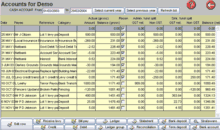Ledger
A ledger[1] is the principal book or computer file for recording and totaling economic transactions measured in terms of a monetary unit of account by account type, with debits and credits in separate columns and a beginning monetary balance and ending monetary balance for each account.
| Part of a series on |
| Accounting |
|---|
 |
|
Major types |
|
Selected accounts |
|
Accounting standards
|
|
|
|
People and organizations
|
|
Development |

Overview
The ledger is a permanent summary of all amounts entered in supporting journals which list individual transactions by date. Every transaction flows from a journal to one or more ledgers. A company's financial statements are generated from summary totals in the ledgers.[2]
Ledgers include:
- Sales ledger, records accounts receivable. This ledger consists of the financial transactions made by customers to the company.
- Purchase ledger records money spent for purchasing by the company.
- General ledger representing the five main[3] account types: assets, liabilities, income, expenses, and capital.
For every debit recorded in a ledger, there must be a corresponding credit so that the debits equal the credits in the grand totals.
Types on the basis of purpose
The three types of ledgers are the general, debtors, and creditors.[4] The general ledger accumulates information from journals. Each month all journals are totaled and posted to the General Ledger. The purpose of the General Ledger is therefore to organize and summarize the individual transactions listed in all the journals. The Debtor Ledger accumulates information from the sales journal. The purpose of the Debtors Ledger is to provide knowledge about which customers owe money to the business, and how much. The Creditors Ledger accumulates information from the purchases journal. The purpose of the Creditors Ledger is to provide knowledge about which suppliers the business owes money to, and how much.
Types on the basis of format
A ledger can have the following two formats.
Physical ledger
This type of ledger is made up of paper. It can be physically touched. Ledgers were invented several centuries ago and this used to be the only available form until the widespread adoption of computers, in the mid to late 20th century.
Digital ledger
This type of ledger is a digital file, or collection of files, or a database. It can be manipulated only by means of computer programs, since it does not have a physical form.
Etymology

The term ledger stems from the English dialect forms liggen or leggen, meaning "to lie or lay" (Dutch: liggen or leggen, German: liegen or legen); in sense it is adapted from the Dutch substantive legger, properly "a book laying or remaining regularly in one place". Originally, a ledger was a large volume of scripture or service book kept in one place in church and openly accessible. According to Charles Wriothesley's Chronicle (1538), "The curates should provide a booke of the bible in Englishe, of the largest volume, to be a ledger in the same church for the parishioners to read on."
In application of this original meaning the commercial usage of the term is for the "principal book of account" in a business house.
See also
- Bookkeeping
- Debits and credits
- Specialized journals
- Final Accounts
- Distributed ledger, sometimes called a shared ledger, is a consensus of replicated, shared, and synchronized digital data geographically spread across multiple sites, countries, and/or institutions.[5]
Notes
- From the English dialect norms liggen or leggen, to lie or lay; in sense adapted from the Dutch substantive legger
- Haber, Jeffry (2004). Accounting Demystified. New York: AMACOM. p. 15. ISBN 0-8144-0790-0.
- Whiteley, John. "Mr". Moncton Accountant | John Whiteley CPA. John Whiteley CPA. Retrieved 1 July 2017.
- "What is a Ledger?". Online Learning for Sports Management. Retrieved 27 September 2018.
- Distributed Ledger Technology: beyond block chain (PDF) (Report). UK Government, Office for Science. January 2016. Retrieved 29 August 2016.
References

Further reading
| Wikimedia Commons has media related to Ledgers. |
| Look up ledger in Wiktionary, the free dictionary. |
- Business Owner's Toolkit: General Ledger from Wolters Kluwer
- General Ledger Entries from NetMBA Business Knowledge Center